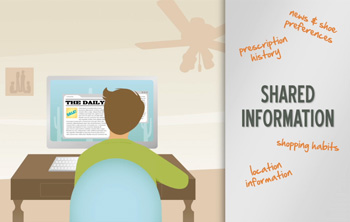If you own your computer, you should own the data that’s on it. That’s the message from Federal Trade Commission Chairman Jon Leibowitz.
At a Washington press conference — also broadcast — the FTC issued a new report on Internet privacy. Leibowitz praised how far the nation’s come in protecting data, even from this time last year. But he also shared that consumers still need more clarity and control over their personal information.
The event opened with this animated primer about how information is collected, and where it goes.
The FTC made three main recommendations:
- Social media sites, apps, browsers, retailers and Internet service providers among others should adopt “privacy by design.” In other words, privacy should come first.
- Companies should work towards better transparency. The average privacy policy, Leibowitz said, is longer than the Declaration of Independence.
- Consumers and businesses should receive simple choices to decide what information is shared. This should include a “Do Not Track” option.
“‘Do Not Track’ from our perspective means do not collect,” Leibowitz said. “We need to have a ‘Do Not Track’ option that is persistent, easy to use and effective. “
In the past year, he said, large platforms and marketers made a lot of progress toward protecting privacy, partly because it’s the right thing to do, and partly because they want to keep consumers’ trust.
“It’s amazing how far these companies have come,” Leibowitz said. “I think we’re all pulling in the right direction. People just get it — it’s the right thing to do … It’s better for your business.”
‘Best practices’

Overall, the report falls more into the category of “best practices” than regulations. The point, he said, was “not to erect a stoplight, but to take a look at the traffic patterns.” Yet he urged Congress to enact tougher privacy protection laws, and noted that the FTC’s power is based in its ability to enforce the law.
For example, last spring Google settled FTC charges that it violated user privacy when it launched Google Buzz. Then last fall Facebook settled an FTC lawsuit alleging it repeatedly deceived users about their privacy.
The lengthy report certainly sets the stage for more debate. It ends with a dissenting statement from FTC Commissioner J. Thomas Rosch. His concerns include that the report had no limiting principles, and could be seen as a mandate.
“It would install ‘Big Brother’ as the watchdog over these practices, not only in the online world but in the offline world,” he wrote. He also added that there’s no universally accepted definition of what “Do Not Track” means.
“I still worry about the constitutionality of banning take-it-or-leave-it choice (in circumstances where the consumer has few alternatives),” Rosch opined. “As a practical matter, that prohibition may chill information collection, and thus impact innovation, regardless whether one’s privacy policy is deceptive or not.”
Terri Thornton, a former reporter and TV news producer, owns Thornton Communications, an award-winning PR and social media firm. She is also a freelance editor for Strategic Finance and Management Accounting Quarterly.

